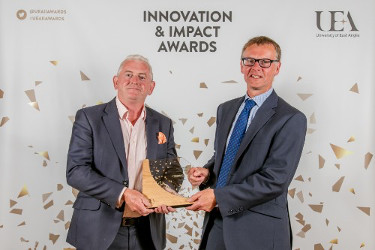
Prof Gerard Parr (pictured left) and Ian Nunney (pictured right), who collected the award on behalf of the CAVA team, commented:
“This is a classic example of different disciplines coming together to tackle the issue of dizziness and find a solution. It’s a testament to the hard work and is a big achievement in getting this recognition.” Prof Gerard Parr (pictured left) and Ian Nunney (pictured right), who collected the award on behalf of the CAVA team, commented: “This is a classic example of different disciplines coming together to tackle the issue of dizziness and find a solution. It’s a testament to the hard work and is a big achievement in getting this recognition.”
Dizziness is common, awful to experience from a patient’s perspective, and has significant implications for an affected individual’s ability to work and enjoy life. Identifying the causes of dizziness is challenging.
A collaboration between NNUH and UEA has led to the development of the CAVA system. The system consists of a diagnostic device worn near-continuously by patients in their own homes, together with sophisticated AI algorithms to analyse the recorded data. Over £2 million has been invested in research into this system by the Medical Research Council and National Institute for Health Research.
When brought to market, it is expected that the CAVA system will result in quicker and more accurate diagnoses for patients, with subsequent swifter access to effective treatments. This will result in significant cost savings for the NHS.

)